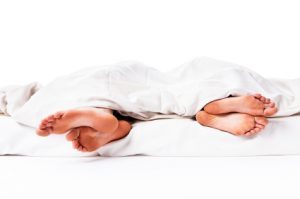Do You Grind Your Teeth at Night? Listen Up!
 Many of us have a habit of grinding our teeth at night, a condition known as bruxism. By definition, bruxism is known as the involuntary or habitual grinding of teeth. However, here’s the problem: most of us are unaware that we’re doing it in the first place because it’ll happen when we are sound asleep in a sleep cycle known as R.E.M. sleep.
Many of us have a habit of grinding our teeth at night, a condition known as bruxism. By definition, bruxism is known as the involuntary or habitual grinding of teeth. However, here’s the problem: most of us are unaware that we’re doing it in the first place because it’ll happen when we are sound asleep in a sleep cycle known as R.E.M. sleep.
What Causes Teeth Grinding at Night?
There are a few reasons why someone may develop an unknown habit of grinding teeth at night:
- Having an abnormal bite
- Having a sleep disorder
- Having teeth that are crooked or missing
However, sometimes the issue is not grinding teeth at night, but during the day when we are consciously awake. The reason here is usually anxiety. People use grinding their teeth as a nervous tic when they are under stressful circumstances.
How Do I know if I’m Grinding My Teeth at Night?
Those who do suffer from teeth grinding at night typically possess these symptoms:
- Having a spouse or friend notify you of your sleeping patterns at night if they are awake while the event occurs
- Dull headaches that have no explanation
- Sensitive or irritated gums
- Sore jaw with no reasonable explanation
- Loose or fractured teeth with no easily identifiable cause
If you possess a couple or more of these symptoms, then there is a good chance you may be grinding your teeth at night. An appointment with an experienced dentist or orthodontist will help you solve the puzzle.
The Solution: Night Guards
A common solution is the use of night guards while you sleep. They’re similar to mouth guards you wear when engaging in sports except they are custom made to fit your mouth and prevent movement of friction between teeth, which is what causes problems. They also help stabilize your jaw while you sleep, preventing unwanted soreness.
Night guards could be purchased over-the-counter but they are not custom-fit for the mouth and will not give you the relief you seek. This is why it is recommended to visit an orthodontist or dentist in order to tackle the issue the right way.
